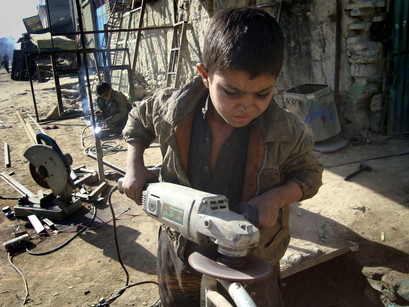By Fraidoon Poya
Herat – Abdul Karim (not his real name) is a nine-year-old Afghan child. He waits under the street traffic light in downtown Herat for the cars to come and cleans their windscreens in the hope of gleaning some money. Abdul is the only breadwinner for his three-member family. He lost his drug-addicted father two years ago, and now supports his family by doing this hard work every day, sometimes begging. Abdul says he has to return home with money, food and other family needs.

Mohammad Gul, an eight-year-old Afghan boy, works in a welding shop in Khost, Dec. 11, 2010. Thousands of Afghan children works to help in supporting their families in Afghanistan. (Photo: AP/Nishanuddin Khan)
Abdul is not the only child who has been forced by poverty and hunger to do hard work, panhandling or cleaning vehicles' windscreens. According to the Herat office of the Afghan Independent Human Rights Commission, thousands of Afghan children in the western provinces work and many are abused.
Basireh Mohammadi, the director of the Department of Labor and Social Affairs in Herat says "finding practical and urgent ways to solve the problems of street children and encouraging them to return to school is one of the major challenges and priorities of this office for 2011."
Basireh Mohammadi lists programmes in the pipeline by foreign agencies, particularly UNICEF, in Herat to provide vocational training capacities for families who send their children out to work, so that they can send their children to school. She adds that they will launch campaigns in the coming year to give vocational training to street children so that they grow in confidence and self-esteem.
"We will encourage street children to stop begging and other work and join schools" she says.
Meanwhile, the Herat Department of Labor and Social affairs is working on a survey in 2011 to gather statistics and data on the number and status of street children. UNICEF supports this study so that donor agencies can use the data to extend their programmes to improve the living conditions of these children.
Government offices, with the support of the United Nations and other agencies, are making some impact to protect the rights of children in the western provinces. But much more needs to be achieved in 2011, so that children like Abdul can regain their childhoods and grow to their full potential.



